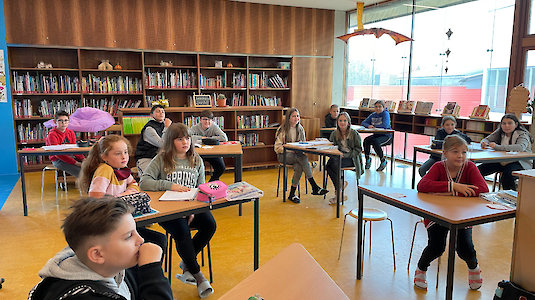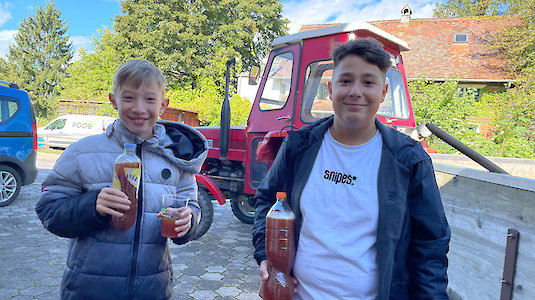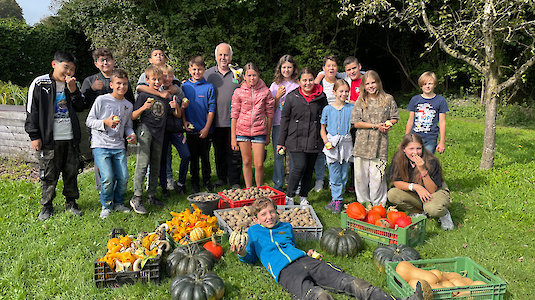In the heart of the village. In the heart of life.
Ecology is a priority at ÖKO-Mittelschule Mäder in Vorarlberg: The overall environmental situation is a subject in its own right at Mäder. Within the framework of ecology lessons, the pupils' work in the school garden plays a very important role.
The ÖKO-Mittelschule Mäder in Vorarlberg is located in the middle of the village. This is not the only way it is optimally connected to the realities of life: Since 2004, the school has been allowed to use the Austrian Ecolabel. In the school year 2021/22, 164 pupils will be taught in 8 classes by a committed pedagogical team.
"Environmentally oriented teaching and an ecological educational environment are topics of a modern, quality-oriented education system". This important statement is the starting point for teaching at ÖKO-Mittelschule Mäder. A very successful video presents the secondary school in all its diversity, conveys very well the pedagogical concept and the joint activities of learners and teachers.
Getting active in the garden. The school garden plays an important role in the lessons: every pupil works in the school's own garden in the subject "Ecology" - and harvests what he or she has sown: Vegetables and herbs! We talked about the garden activities with Ms. Nina Schläffer. She teaches mathematics at the ÖKO-Mittelschule Mäder and is also responsible there for activities related to the Austrian Ecolabel.
Ms Schläffer, working in the school garden is part of the lessons in the compulsory subject "Ecology"?
"Exactly. In class, the pupils first get to know the ground plan of the school garden. Then they do a 'walk-through' together. During this walk, the children are introduced to the plants in the school garden. They are taught basic knowledge: Where are the apple trees? Where can I find which school beds? What is a field? Then the pupils get to know the bed plants theoretically. Questions such as 'Who are good plant neighbours? Why are marigolds planted where?'. The soil conditions are also discussed with the experts from the fruit gardening association of the municipality of Mäder. I would like to take this opportunity to thank the municipality of Mäder for their very good cooperation."
The members of the fruit gardening association also look after the school garden during the summer holidays! In the first and second grade, "Ecology" is a compulsory subject at school. For the fourth grades, the elective subject "Economic/Life Science" is offered.
Sowing and harvesting. But back to the students' work in the school garden. Nina Schläffer says: "The first and second classes look after 'their' beds in the school garden. The procedure is as follows: In the first class, the pupils plant pumpkins, potatoes and popcorn corn in spring. Then, in the second class, they experience the success of the harvest in autumn. So they are there from planting to harvesting."

What is actually grown in the school garden?
"In the pupils' bed, lettuce, kohlrabi, leeks and radishes as well as marigolds thrive. Then there is a potato field. Popcorn maize and ornamental and edible pumpkins are grown in their own beds next to the field. In addition, the pupils look after herb beds."
Fresh from the garden into the school kitchen. During the school year, food grown in the school garden is turned into tasty dishes in cooking lessons: Nina Schläffer explains: "In the first lesson, the cooking teachers show the pupils where and how (!) the vegetables and spices are picked from the garden. From the second lesson onwards, the pupils fetch the spices and vegetables from the school garden on their own. They then also know their way around the cellar where we store the potatoes. In class they cook pumpkin soup or potato goulash together! All home-grown! The school garden also supplies the spices for the herbal salt!"

To what extent do the gardening activities influence the social behaviour of the young gardeners? "Outdoor lessons are always something different. The children automatically acquire 'different' skills and abilities than in the classroom. That is clear. The pupils help out, help each other. They understand how gardening works from cultivation to harvest. But they also realise that the potatoes in the supermarket do not look like the ones they have grown. And they know why. And in cooking lessons they experience that what they have grown themselves tastes better (!)! Of course, these are important insights that also have an impact on the children's future. All in all, the sometimes strenuous work in the school garden promotes a sense of togetherness among the pupils! That is a very important aspect," says Nina Schläffer happily.
The ÖKO-Mittelschule Mäder is on the right track: the pupils learn to work in the garden together. This gives them a much better understanding of biological relationships. They also quickly realise what is good for the environment and that what they grow themselves tastes better - when it is served as healthy food on the common table. The pupils also get to know and appreciate each other better. In the middle of the village! In the middle of life - an ecological success story!
